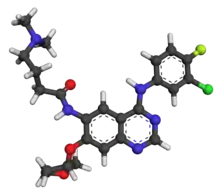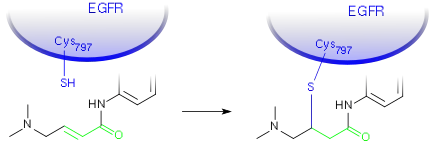 | |
 | |
| Clinical data | |
|---|---|
| Trade names | Gilotrif, Giotrif, Afanix |
| Other names | BIBW 2992 |
| AHFS/Drugs.com | Monograph |
| MedlinePlus | a613044 |
| License data | |
| Pregnancy category |
|
| Routes of administration | By mouth |
| ATC code | |
| Legal status | |
| Legal status | |
| Pharmacokinetic data | |
| Protein binding | 95% |
| Metabolism | CYP not involved |
| Elimination half-life | 37 hours |
| Excretion | Faeces (85%), urine (4%) |
| Identifiers | |
| |
| CAS Number |
|
| PubChem CID | |
| IUPHAR/BPS | |
| DrugBank | |
| ChemSpider | |
| UNII | |
| KEGG | |
| ChEBI | |
| ChEMBL | |
| CompTox Dashboard (EPA) | |
| ECHA InfoCard | 100.239.035 |
| Chemical and physical data | |
| Formula | C24H25ClFN5O3 |
| Molar mass | 485.94 g·mol−1 |
| 3D model (JSmol) | |
| |
| |
| | |
Afatinib, sold under the brand name Gilotrif among others, is a medication which is used to treat non-small cell lung carcinoma (NSCLC).[2][3][4] It belongs to the tyrosine kinase inhibitor family of medications.[5] It is taken by mouth.[5][1]
It is mainly used to treating cases of NSCLC that harbour mutations in the epidermal growth factor receptor (EGFR) gene.[6]
It is on the World Health Organization's List of Essential Medicines.[7]
Medical uses
It has received regulatory approval for use as a treatment for non-small cell lung cancer,[1][5][8][9] although there is emerging evidence to support its use in other cancers such as breast cancer.[10]
Adverse effects
Adverse effects by frequency include:[1][5][8][9][11]
- Very common (>10% frequency)
- Diarrhea (>90%)
- Rash/dermatitis acneform
- Stomatitis
- Paronychia
- Decreased appetite
- Nose bleed
- Itchiness
- Dry skin
- Common (1–10% frequency)
- Dehydration
- Taste changes
- Dry eye
- Cystitis
- Cheilitis
- Fever
- Runny/stuffy nose
- Low amount of potassium in the blood
- Conjunctivitis
- Increased ALT
- Increased AST
- Hand-foot syndrome
- Muscle spasms
- Kidney impairment and/or failure
- Uncommon (0.1-1% frequency)
Mechanism of action
Like lapatinib and neratinib, afatinib is a protein kinase inhibitor that also irreversibly inhibits human epidermal growth factor receptor 2 (Her2) and epidermal growth factor receptor (EGFR) kinases. Afatinib is not only active against EGFR mutations targeted by first generation tyrosine-kinase inhibitors (TKIs) like erlotinib or gefitinib, but also against less common mutations which are resistant to these drugs. However, it is not active against the T790M mutation which generally requires third generation drugs like osimertinib.[12] Because of its additional activity against Her2, it is being investigated for breast cancer as well as other EGFR and Her2 driven cancers.[3]

Clinical trials
In March 2010, a Phase III trial in NSCLC patients called Lux-Lung 5 began with this drug.[14] Fall 2010 interim results suggested the drug extended progression-free survival threefold compared to placebo, but did not extend overall survival.[15] In May 2012, the Phase IIb/III trial Lux-Lung 1 came to the same conclusion.[16]
In January 2015, a Phase III trial in people with NSCLC suggested the drug extended life expectancy in stage IV NSCLC adenocarcinoma with EGFR Mutation type del 19-positive tumors, compared to cisplatin-based chemotherapy by a year (33 months vs. 21 months).[17] It also shows strong activity against exon 18 mutations (particularly G719) and is currently the preferred EGFR-TKI therapy for exon 18 mutations (particularly G719x).[18]
Phase II results for breast cancer that over-expresses the protein human epidermal growth factor receptor 2 (Her2-positive breast cancer) were described as promising by the authors, with 19 of 41 patients achieving benefit from afatinib.[10] Double-blind Phase III trials are under way to confirm or refute this finding. Her2-negative breast cancers showed limited or no response to the drug.[19]
Society and culture
Brand names
In Bangladesh under the trade name Afanix.
References
- 1 2 3 4 "Gilotrif (afatinib) tablet, film coated". DailyMed. Boehringer Ingelheim Pharmaceuticals, Inc. 18 October 2019. Retrieved 4 November 2020.
- ↑ Spreitzer H (13 May 2008). "Neue Wirkstoffe – Tovok". Österreichische Apothekerzeitung (in German) (10/2008): 498.
- 1 2 Minkovsky N, Berezov A (December 2008). "BIBW-2992, a dual receptor tyrosine kinase inhibitor for the treatment of solid tumors". Current Opinion in Investigational Drugs. 9 (12): 1336–46. PMID 19037840.
- ↑ "Gilotrif (afatinib)" (PDF). US Food and Drug Administration. Retrieved 11 March 2021.
- 1 2 3 4 "Giotrif Afatinib (as afatinib dimaleate)" (PDF). TGA eBusiness Services. Boehringer Ingelheim Pty Limited. 7 November 2013. Retrieved 28 January 2014.
- ↑ Vavalà T (2017). "Role of afatinib in the treatment of advanced lung squamous cell carcinoma". Clinical Pharmacology. 9: 147–157. doi:10.2147/CPAA.S112715. PMC 5709991. PMID 29225480.
- ↑ World Health Organization (2021). World Health Organization model list of essential medicines: 22nd list (2021). Geneva: World Health Organization. hdl:10665/345533. WHO/MHP/HPS/EML/2021.02.
- 1 2 "Giotrif 20 mg film-coated tablets – Summary of Product Characteristics (SPC)". electronic Medicines Compendium. Boehringer Ingelheim Limited. 20 January 2014. Retrieved 28 January 2014.
- 1 2 "Giotrif : EPAR -Product Information" (PDF). European Medicines Agency. Boehringer Ingelheim International GmbH. 16 October 2013. Retrieved 28 January 2014.
- 1 2 Lin NU, Winer EP, Wheatley D, Carey LA, Houston S, Mendelson D, et al. (June 2012). "A phase II study of afatinib (BIBW 2992), an irreversible ErbB family blocker, in patients with HER2-positive metastatic breast cancer progressing after trastuzumab". Breast Cancer Research and Treatment. 133 (3): 1057–65. doi:10.1007/s10549-012-2003-y. PMC 3387495. PMID 22418700.
- ↑ "Gilotrif (afatinib) dosing, indications, interactions, adverse effects, and more". Medscape Reference. WebMD. Retrieved 28 January 2014.
- ↑ Li D, Ambrogio L, Shimamura T, Kubo S, Takahashi M, Chirieac LR, et al. (August 2008). "BIBW2992, an irreversible EGFR/HER2 inhibitor highly effective in preclinical lung cancer models". Oncogene. 27 (34): 4702–11. doi:10.1038/onc.2008.109. PMC 2748240. PMID 18408761.
- ↑ Schubert-Zsilavecz, M, Wurglics, M, Neue Arzneimittel Frühjahr 2013. (in German)
- ↑ Clinical trial number NCT01085136 for "LUX-Lung 5: BIBW 2992 Plus Weekly Paclitaxel Versus Investigator's Choice of Single Agent Chemotherapy Following BIBW 2992 Monotherapy in Non-small Cell Lung Cancer Patients Failing Erlotinib or Gefitinib" at ClinicalTrials.gov
- ↑ "Afatinib (BIBW 2992*) Triples Progression Free Survival in Phase III Study in Lung Cancer Patients" (Press release). BusinessWire. 11 October 2010.
- ↑ Miller VA, Hirsh V, Cadranel J, Chen YM, Park K, Kim SW, et al. (May 2012). "Afatinib versus placebo for patients with advanced, metastatic non-small-cell lung cancer after failure of erlotinib, gefitinib, or both, and one or two lines of chemotherapy (LUX-Lung 1): a phase 2b/3 randomised trial". The Lancet. Oncology. 13 (5): 528–38. doi:10.1016/S1470-2045(12)70087-6. PMID 22452896.
- ↑ Yang JC, Wu YL, Schuler M, Sebastian M, Popat S, Yamamoto N, et al. (February 2015). "Afatinib versus cisplatin-based chemotherapy for EGFR mutation-positive lung adenocarcinoma (LUX-Lung 3 and LUX-Lung 6): analysis of overall survival data from two randomised, phase 3 trials" (PDF). The Lancet. Oncology. 16 (2): 141–51. doi:10.1016/s1470-2045(14)71173-8. PMID 25589191.
- ↑ Kobayashi Y, Togashi Y, Yatabe Y, Mizuuchi H, Jangchul P, Kondo C, et al. (December 2015). "EGFR Exon 18 Mutations in Lung Cancer: Molecular Predictors of Augmented Sensitivity to Afatinib or Neratinib as Compared with First- or Third-Generation TKIs". Clinical Cancer Research. 21 (23): 5305–13. doi:10.1158/1078-0432.CCR-15-1046. PMID 26206867.
- ↑ Schuler M, Awada A, Harter P, Canon JL, Possinger K, Schmidt M, et al. (August 2012). "A phase II trial to assess efficacy and safety of afatinib in extensively pretreated patients with HER2-negative metastatic breast cancer". Breast Cancer Research and Treatment. 134 (3): 1149–59. doi:10.1007/s10549-012-2126-1. PMC 3409367. PMID 22763464.
External links
![]() Media related to Afatinib at Wikimedia Commons
Media related to Afatinib at Wikimedia Commons
- "Afatinib". Drug Information Portal. U.S. National Library of Medicine.
- "Afatinib dimaleate". Drug Information Portal. U.S. National Library of Medicine.